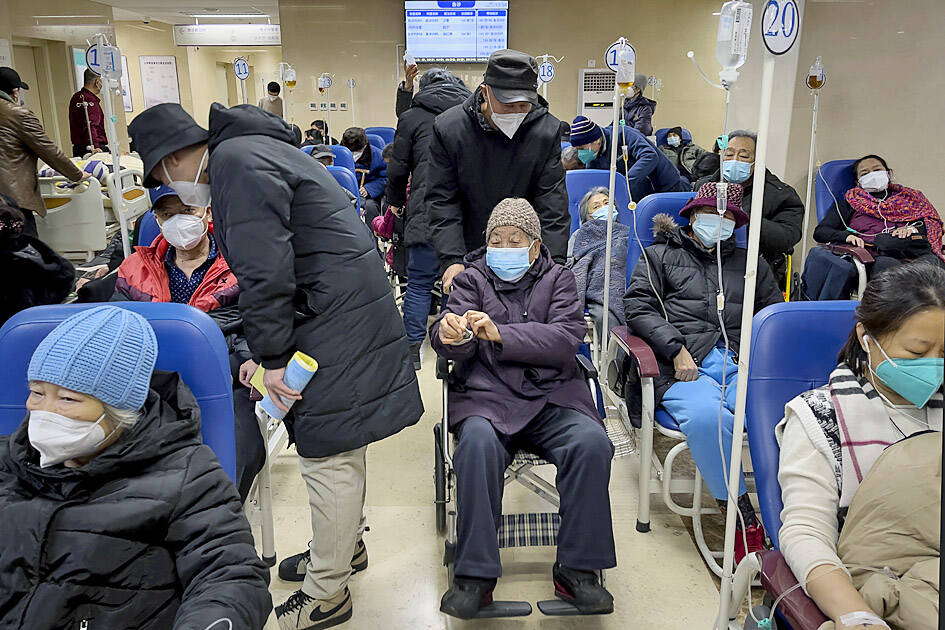Chinese state media played down the severity of a surge of COVID-19 infections ahead of an expected briefing yesterday by its scientists to the WHO, which is hoping for a “detailed discussion” on the evolution of the coronavirus.
China’s abrupt U-turn on COVID-19 controls on Dec. 7, as well as the accuracy of its case and mortality data, have come under increasing scrutiny at home and abroad.
The Chinese Ministry of Foreign Affairs labeled travel entry curbs imposed by some nations as “simply unreasonable,” saying they “lacked scientific basis.”

Photo: AP
“We are willing to improve communication with the world, but ... we are firmly opposed to attempts to manipulate the epidemic prevention and control measures for political purposes, and will take corresponding measures in different situations according to the principle of reciprocity,” ministry spokeswoman Mao Ning (毛寧) told reporters in Beijing.
As the virus spreads unchecked, funeral parlors have reported a spike in demand for their services and international health experts predict at least 1 million deaths in China this year.
China yesterday reported three new COVID-19 deaths, taking its official death toll since the pandemic began to 5,253.
The People’s Daily yesterday cited Chinese experts as saying the illness caused by the virus was relatively mild for most people.
“Severe and critical illnesses account for 3 percent to 4 percent of infected patients currently admitted to designated hospitals in Beijing,” Beijing Chaoyang Hospital vice president Tong Zhaohui (童朝暉) told the newspaper.
West China Tianfu Hospital of Sichuan University president Kang Yan (康焰) said that in the past three weeks, 46 patients had been admitted to intensive care units, or about 1 percent of symptomatic infections.
The emergencies area at Zhongshan Hospital in Shanghai was packed with patients yesterday, a witness said.
Some were in beds in the corridor receiving intravenous therapy, while dozens were lining up around them, waiting to see a doctor.
The WHO has urged Chinese health officials to regularly share specific and real-time information on the outbreak. It has invited Chinese scientists to present detailed data on viral sequencing at a technical advisory group meeting. It has also asked China to share data on hospitalizations, deaths and vaccinations.
Ahead of the meeting scheduled for yesterday afternoon in Geneva, Switzerland, a WHO spokesperson said that a “detailed discussion” was expected about circulating variants in China, and globally, with Chinese scientists expected to make a presentation, but some experts doubted that China would be very forthright.
“I don’t think China will be very sincere in disclosing information,” said Alfred Wu (吳木鑾), associate professor at the Lee Kuan Yew School of Public Policy at National University of Singapore. “They would rather just keep it to themselves or they would say nothing happened, nothing is new. My own sense is that we could assume that there is nothing new ... but the problem is China’s transparency issue is always there.”

DEFENDING DEMOCRACY: Taiwan shares the same values as those that fought in WWII, and nations must unite to halt the expansion of a new authoritarian bloc, Lai said The government yesterday held a commemoration ceremony for Victory in Europe (V-E) Day, joining the rest of the world for the first time to mark the anniversary of the end of World War II in Europe. Taiwan honoring V-E Day signifies “our growing connections with the international community,” President William Lai (賴清德) said at a reception in Taipei on the 80th anniversary of V-E Day. One of the major lessons of World War II is that “authoritarianism and aggression lead only to slaughter, tragedy and greater inequality,” Lai said. Even more importantly, the war also taught people that “those who cherish peace cannot

STEADFAST FRIEND: The bills encourage increased Taiwan-US engagement and address China’s distortion of UN Resolution 2758 to isolate Taiwan internationally The Presidential Office yesterday thanked the US House of Representatives for unanimously passing two Taiwan-related bills highlighting its solid support for Taiwan’s democracy and global participation, and for deepening bilateral relations. One of the bills, the Taiwan Assurance Implementation Act, requires the US Department of State to periodically review its guidelines for engagement with Taiwan, and report to the US Congress on the guidelines and plans to lift self-imposed limitations on US-Taiwan engagement. The other bill is the Taiwan International Solidarity Act, which clarifies that UN Resolution 2758 does not address the issue of the representation of Taiwan or its people in

Taiwanese Olympic badminton men’s doubles gold medalist Wang Chi-lin (王齊麟) and his new partner, Chiu Hsiang-chieh (邱相榤), clinched the men’s doubles title at the Yonex Taipei Open yesterday, becoming the second Taiwanese team to win a title in the tournament. Ranked 19th in the world, the Taiwanese duo defeated Kang Min-hyuk and Ki Dong-ju of South Korea 21-18, 21-15 in a pulsating 43-minute final to clinch their first doubles title after teaming up last year. Wang, the men’s doubles gold medalist at the 2020 and 2024 Olympics, partnered with Chiu in August last year after the retirement of his teammate Lee Yang

The Philippines yesterday criticized a “high-risk” maneuver by a Chinese vessel near the disputed Scarborough Shoal (Huangyan Island, 黃岩島) in a rare incident involving warships from the two navies. The Scarborough Shoal — a triangular chain of reefs and rocks in the contested South China Sea — has been a flash point between the countries since China seized it from the Philippines in 2012. Taiwan also claims the shoal. Monday’s encounter took place approximately 11.8 nautical miles (22km) southeast” of the Scarborough Shoal, the Philippine military said, during ongoing US-Philippine military exercises that Beijing has criticized as destabilizing. “The Chinese frigate BN 554 was